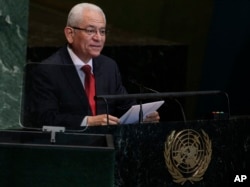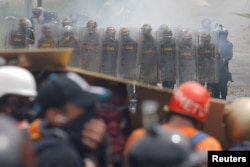The United States denounced the government of Venezuelan President Nicolas Maduro on Tuesday for suppressing protests and called for free elections, saying that he must not be allowed to follow a “dictatorship” path like Syrian leader Bashar al-Assad.
The Maduro government calls the protesters violent coup-mongers, supported by the United States.
“This is an economic, political and humanitarian crisis that demands the world's attention,” Nikki Haley, U.S. ambassador to the United Nations, told a U.S.-hosted panel of Venezuelan activists and experts held on the sidelines of the U.N. Human Rights Council in Geneva.
“The Venezuelan government is in the midst of destroying human rights and democracy in Venezuela. It is conducting a campaign of violence and intimidation against unarmed demonstrators, businesses, civil society and freely elected political opposition,” she said.
But Jorge Valero, Venezuela ambassador, told the Council that Venezuelans enjoyed fundamental freedoms, adding: “This (U.S.) government has no moral authority to set itself up as a universal judge of human rights.”
'Turning into a dictatorship’
Haley, speaking later at the Graduate Institute in Geneva, said states must prevent human rights crises from becoming armed conflicts.
“It's the reason why I am so concerned about Venezuela. Because in Venezuela, (one is) hard-pressed to see that Maduro is not following in the same steps as Assad. We have to make sure we stop it before it gets to that point,” she said.
“It's supposed to be democracy, it's turning into a dictatorship and that's a problem,” she added.
At least 65 people have died in unrest since early April, with hundreds injured. Some 3,000 people have been arrested, with around one-third still behind bars, according to rights group Penal Forum.
“Over 300 people arrested at demonstrations have been taken to military courts. They are being treated as a form of prisoners of war,” Alonso Medina Roa of Penal Reform, which is providing legal defense to hundreds, told the event.
'Fooling no one'
Maduro's foes are demanding general elections, freedom for jailed activists, humanitarian aid, and autonomy for the opposition-controlled National Assembly.
In May, Maduro announced a plan for a “constituent assembly” with powers to rewrite the constitution, in what he says is a bid to bring back peace. But opponents say he is seeking to dodge national elections and has ignored demands for an end to crushing food and medicine shortages.
“The Venezuela regime is fooling no one. Recognizing that its grip on power has slipped, it is yet again trying to change the rules of the game,” Haley said.
“There are many things that could be done to help the people of Venezuela. But they really only need one thing: a free election.”
Venezuela ranks last in Latin America for transparency, said Mercedes de Freitas, executive director of the Venezuela chapter of Transparency International. She blamed “extremely weak institutions and laws constantly being changed to increase opacity.”







